

SUBSCRIBE TO OUR FREE NEWSLETTER
Daily news & progressive opinion—funded by the people, not the corporations—delivered straight to your inbox.
5
#000000
#FFFFFF
To donate by check, phone, or other method, see our More Ways to Give page.


Daily news & progressive opinion—funded by the people, not the corporations—delivered straight to your inbox.
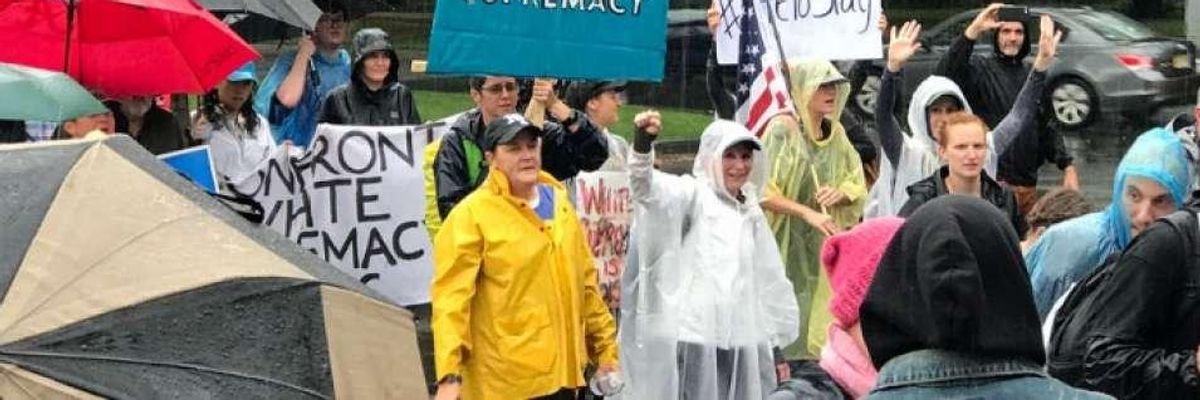
In our new report, White Supremacy is the Pre-existing Condition, we found that the concentration of wealth has surged during the pandemic, further exacerbating an already extreme racial wealth divide. (Photo: Baynard Woods/Twitter)
On June 19th, people across the United States will mark the anniversary of the emancipation of the last enslaved people in the United States by taking to the streets to demand Black Lives Matter.
Behind the protests over police violence are the painful racial disparities in the COVID-19 pandemic. And behind those health disparities is the persistent and glaring racial wealth divide that has weakened the body politic.
The racial wealth divide is where the past shows up in the present. The glaring gap in wealth reflects the multigenerational history of white supremacy in the United States and the systematic denial of wealth-building opportunities to Black people. Chattel slavery, Jim Crow, segregation, and predatory loans are reflected in the wide disparities in bank accounts, homeownership, financial wealth, and overall well-being between white people and Black and Latino people in the United States.
In our new report, White Supremacy is the Pre-existing Condition, we found that the concentration of wealth has surged during the pandemic, further exacerbating an already extreme racial wealth divide.
What does that look like? In the 12 weeks since people in the U.S. began sheltering in place, U.S. billionaire wealth increased by more than $637 billion - the equivalent of 13 percent of all the wealth held by the nation's 41 million Black people.
U.S. billionaires altogether have $3.581 trillion in wealth. That amount is 76 percent of the $4.68 trillion of cumulative Black wealth, and exceeds the $3.49 trillion of total Latino wealth in the U.S.
The effects of the racial wealth divide are particularly pernicious in home ownership, one of the driving forces of wealth accumulation in the United States. The combined $921 billion in wealth of the top 12 U.S. billionaires is the equivalent to the home equity wealth of the entire Black population of 17 million households. And the top 70 U.S. billionaires together hold $1.9 trillion, which is the equivalent to the home equity wealth of all Black and Latino households combined.
The corrective to the racial wealth divide must come through structural change, not the actions of individuals. The policies aimed at recovery from the 2009 recession only worsened the racial wealth divide. Congress shuffled money to the large corporations and firms represented by white executives and shareholders, all while leaving the distressed homeowners, predominately Black and Latino, with little support. In fact, the bailout privileged some of the same firms that targeted subprime lending towards Black people.
We cannot repeat these same mistakes. In our report, we highlight eight potential solutions that can make real progress in bridging the divide.
First, there are the emergency measures that can be enacted now, in the midst of the pandemic:
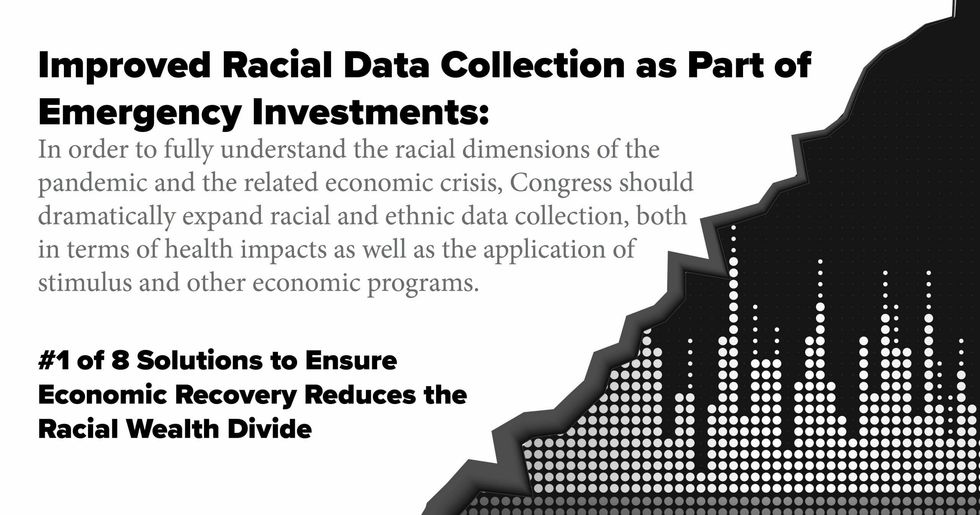
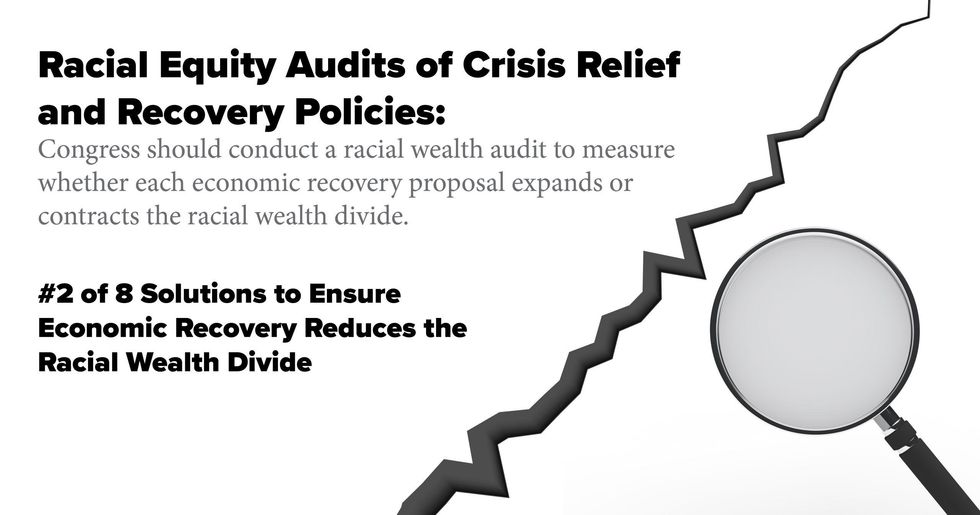
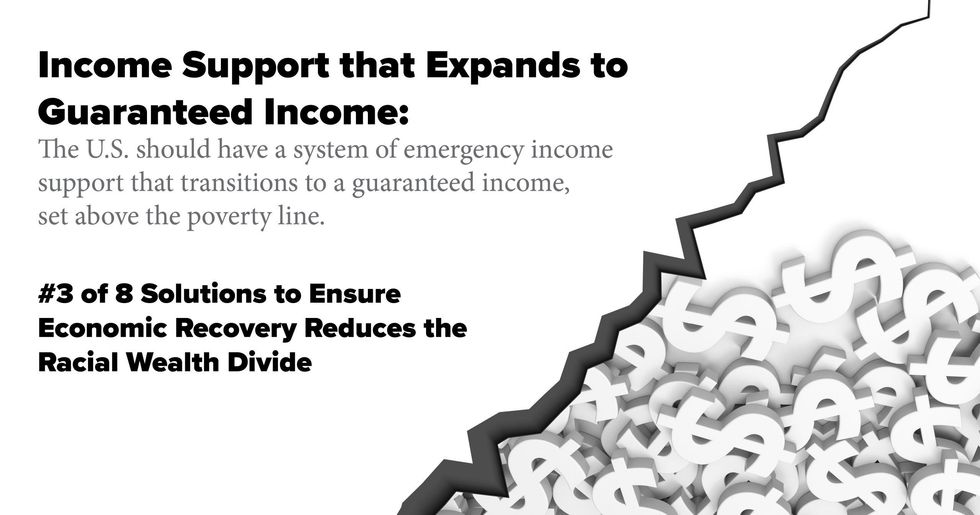
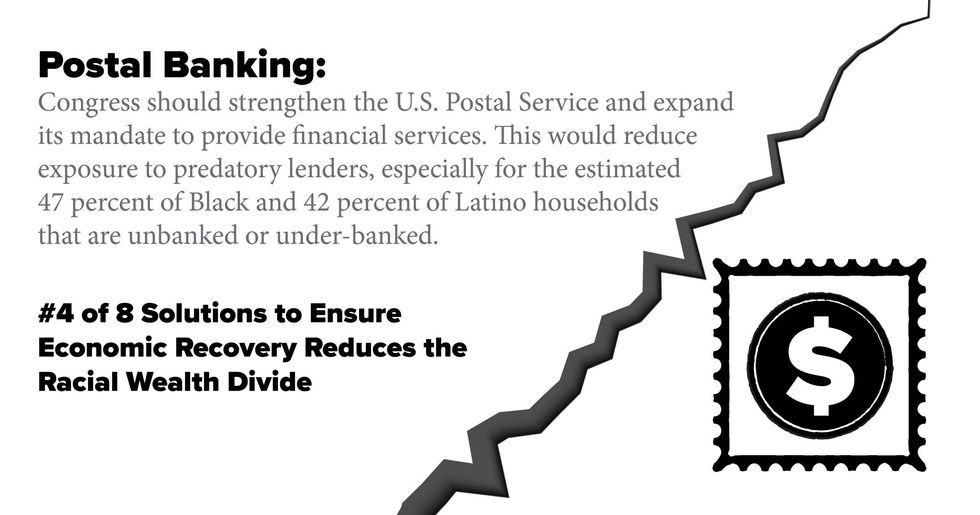
We have also outlined a series of solutions to undertake as the country emerges from this recession.
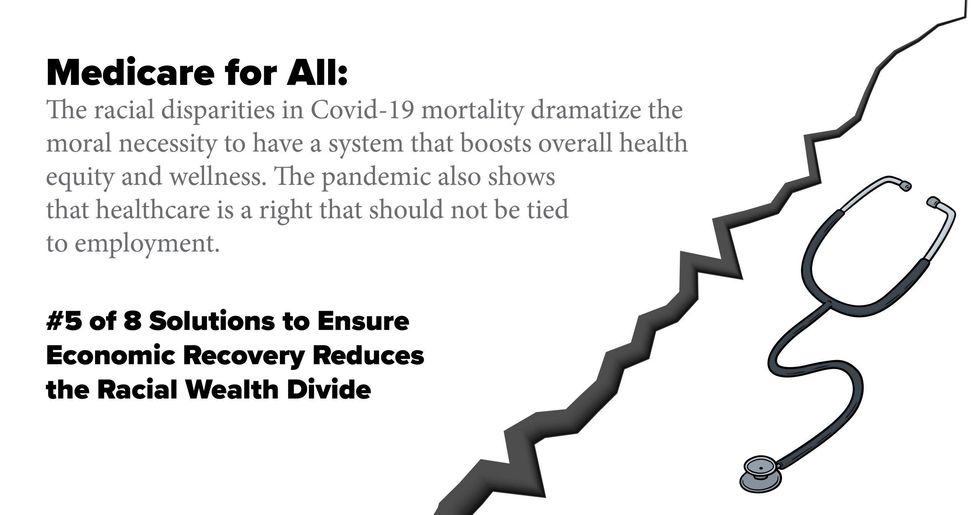
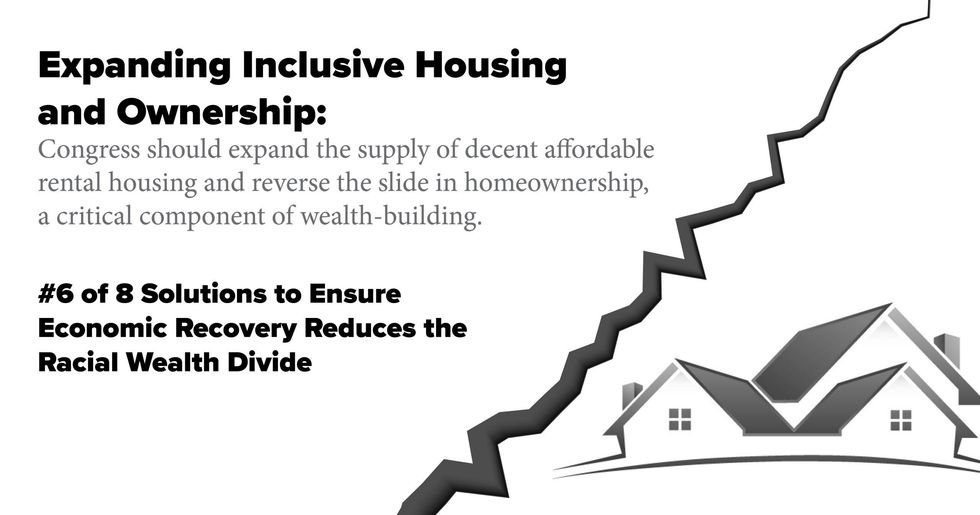
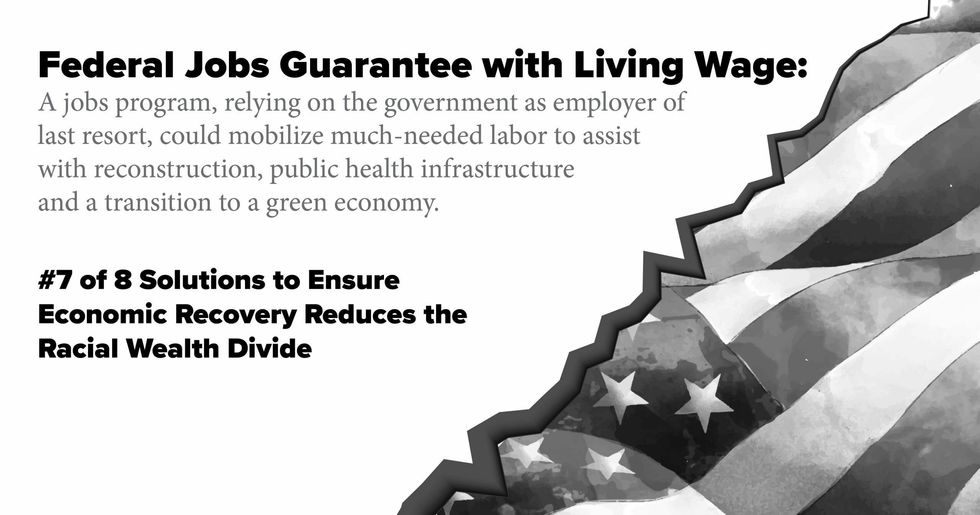
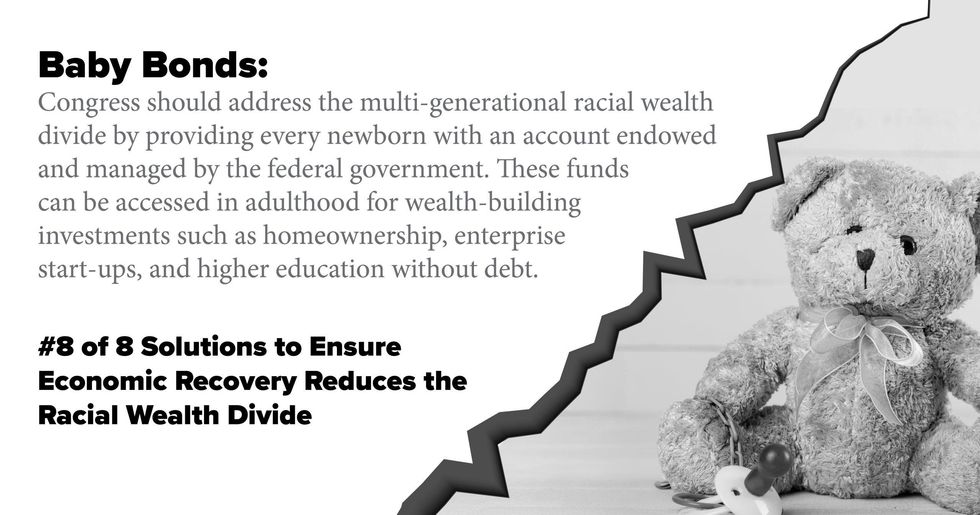
These eight solutions could dramatically decrease racial wealth gaps, and Congress shouldn't wait until they've raised revenue to implement this new social contract. They should, however, tackle the roots of wealth concentration that supercharge the racial wealth divide. To do this, Congress must reverse the upside down tax subsidies that mostly flow to the wealthiest households, and redirect those funds to communities that have historically been excluded from wealth-building government programs.
Congress must also issue a host of new progressive tax programs. Some examples include a millionaire surtax on incomes over $2 million, a financial transaction tax on trades of stocks and derivatives, and an annual wealth tax. Estate tax reforms to boost rates on billionaire inheritances, as well as plugging loopholes, can also help diminish wealth dynasties. Additionally, Congress must use all the tools at its disposal to shut down the hidden wealth system that protects an estimated $21 trillion from tax enforcement.
Trump and Musk are on an unconstitutional rampage, aiming for virtually every corner of the federal government. These two right-wing billionaires are targeting nurses, scientists, teachers, daycare providers, judges, veterans, air traffic controllers, and nuclear safety inspectors. No one is safe. The food stamps program, Social Security, Medicare, and Medicaid are next. It’s an unprecedented disaster and a five-alarm fire, but there will be a reckoning. The people did not vote for this. The American people do not want this dystopian hellscape that hides behind claims of “efficiency.” Still, in reality, it is all a giveaway to corporate interests and the libertarian dreams of far-right oligarchs like Musk. Common Dreams is playing a vital role by reporting day and night on this orgy of corruption and greed, as well as what everyday people can do to organize and fight back. As a people-powered nonprofit news outlet, we cover issues the corporate media never will, but we can only continue with our readers’ support. |
Chuck Collins is a senior scholar at the Institute for Policy Studies where he co-edits Inequality.org. His near future novel "Altar to An Erupting Sun” explores one community’s response to climate disruption. He is author of numerous books and reports on inequality and the racial wealth divide, including “The Wealth Hoarders: How Billionaires Spend Millions to Hide Trillions,” “Born on Third Base,” and, with Bill Gates Sr., of “Wealth and Our Commonwealth: Why American Should Tax Accumulated Fortunes.” See more of his writing at www.chuckcollinswrites.com
On June 19th, people across the United States will mark the anniversary of the emancipation of the last enslaved people in the United States by taking to the streets to demand Black Lives Matter.
Behind the protests over police violence are the painful racial disparities in the COVID-19 pandemic. And behind those health disparities is the persistent and glaring racial wealth divide that has weakened the body politic.
The racial wealth divide is where the past shows up in the present. The glaring gap in wealth reflects the multigenerational history of white supremacy in the United States and the systematic denial of wealth-building opportunities to Black people. Chattel slavery, Jim Crow, segregation, and predatory loans are reflected in the wide disparities in bank accounts, homeownership, financial wealth, and overall well-being between white people and Black and Latino people in the United States.
In our new report, White Supremacy is the Pre-existing Condition, we found that the concentration of wealth has surged during the pandemic, further exacerbating an already extreme racial wealth divide.
What does that look like? In the 12 weeks since people in the U.S. began sheltering in place, U.S. billionaire wealth increased by more than $637 billion - the equivalent of 13 percent of all the wealth held by the nation's 41 million Black people.
U.S. billionaires altogether have $3.581 trillion in wealth. That amount is 76 percent of the $4.68 trillion of cumulative Black wealth, and exceeds the $3.49 trillion of total Latino wealth in the U.S.
The effects of the racial wealth divide are particularly pernicious in home ownership, one of the driving forces of wealth accumulation in the United States. The combined $921 billion in wealth of the top 12 U.S. billionaires is the equivalent to the home equity wealth of the entire Black population of 17 million households. And the top 70 U.S. billionaires together hold $1.9 trillion, which is the equivalent to the home equity wealth of all Black and Latino households combined.
The corrective to the racial wealth divide must come through structural change, not the actions of individuals. The policies aimed at recovery from the 2009 recession only worsened the racial wealth divide. Congress shuffled money to the large corporations and firms represented by white executives and shareholders, all while leaving the distressed homeowners, predominately Black and Latino, with little support. In fact, the bailout privileged some of the same firms that targeted subprime lending towards Black people.
We cannot repeat these same mistakes. In our report, we highlight eight potential solutions that can make real progress in bridging the divide.
First, there are the emergency measures that can be enacted now, in the midst of the pandemic:




We have also outlined a series of solutions to undertake as the country emerges from this recession.




These eight solutions could dramatically decrease racial wealth gaps, and Congress shouldn't wait until they've raised revenue to implement this new social contract. They should, however, tackle the roots of wealth concentration that supercharge the racial wealth divide. To do this, Congress must reverse the upside down tax subsidies that mostly flow to the wealthiest households, and redirect those funds to communities that have historically been excluded from wealth-building government programs.
Congress must also issue a host of new progressive tax programs. Some examples include a millionaire surtax on incomes over $2 million, a financial transaction tax on trades of stocks and derivatives, and an annual wealth tax. Estate tax reforms to boost rates on billionaire inheritances, as well as plugging loopholes, can also help diminish wealth dynasties. Additionally, Congress must use all the tools at its disposal to shut down the hidden wealth system that protects an estimated $21 trillion from tax enforcement.
Chuck Collins is a senior scholar at the Institute for Policy Studies where he co-edits Inequality.org. His near future novel "Altar to An Erupting Sun” explores one community’s response to climate disruption. He is author of numerous books and reports on inequality and the racial wealth divide, including “The Wealth Hoarders: How Billionaires Spend Millions to Hide Trillions,” “Born on Third Base,” and, with Bill Gates Sr., of “Wealth and Our Commonwealth: Why American Should Tax Accumulated Fortunes.” See more of his writing at www.chuckcollinswrites.com
On June 19th, people across the United States will mark the anniversary of the emancipation of the last enslaved people in the United States by taking to the streets to demand Black Lives Matter.
Behind the protests over police violence are the painful racial disparities in the COVID-19 pandemic. And behind those health disparities is the persistent and glaring racial wealth divide that has weakened the body politic.
The racial wealth divide is where the past shows up in the present. The glaring gap in wealth reflects the multigenerational history of white supremacy in the United States and the systematic denial of wealth-building opportunities to Black people. Chattel slavery, Jim Crow, segregation, and predatory loans are reflected in the wide disparities in bank accounts, homeownership, financial wealth, and overall well-being between white people and Black and Latino people in the United States.
In our new report, White Supremacy is the Pre-existing Condition, we found that the concentration of wealth has surged during the pandemic, further exacerbating an already extreme racial wealth divide.
What does that look like? In the 12 weeks since people in the U.S. began sheltering in place, U.S. billionaire wealth increased by more than $637 billion - the equivalent of 13 percent of all the wealth held by the nation's 41 million Black people.
U.S. billionaires altogether have $3.581 trillion in wealth. That amount is 76 percent of the $4.68 trillion of cumulative Black wealth, and exceeds the $3.49 trillion of total Latino wealth in the U.S.
The effects of the racial wealth divide are particularly pernicious in home ownership, one of the driving forces of wealth accumulation in the United States. The combined $921 billion in wealth of the top 12 U.S. billionaires is the equivalent to the home equity wealth of the entire Black population of 17 million households. And the top 70 U.S. billionaires together hold $1.9 trillion, which is the equivalent to the home equity wealth of all Black and Latino households combined.
The corrective to the racial wealth divide must come through structural change, not the actions of individuals. The policies aimed at recovery from the 2009 recession only worsened the racial wealth divide. Congress shuffled money to the large corporations and firms represented by white executives and shareholders, all while leaving the distressed homeowners, predominately Black and Latino, with little support. In fact, the bailout privileged some of the same firms that targeted subprime lending towards Black people.
We cannot repeat these same mistakes. In our report, we highlight eight potential solutions that can make real progress in bridging the divide.
First, there are the emergency measures that can be enacted now, in the midst of the pandemic:




We have also outlined a series of solutions to undertake as the country emerges from this recession.




These eight solutions could dramatically decrease racial wealth gaps, and Congress shouldn't wait until they've raised revenue to implement this new social contract. They should, however, tackle the roots of wealth concentration that supercharge the racial wealth divide. To do this, Congress must reverse the upside down tax subsidies that mostly flow to the wealthiest households, and redirect those funds to communities that have historically been excluded from wealth-building government programs.
Congress must also issue a host of new progressive tax programs. Some examples include a millionaire surtax on incomes over $2 million, a financial transaction tax on trades of stocks and derivatives, and an annual wealth tax. Estate tax reforms to boost rates on billionaire inheritances, as well as plugging loopholes, can also help diminish wealth dynasties. Additionally, Congress must use all the tools at its disposal to shut down the hidden wealth system that protects an estimated $21 trillion from tax enforcement.